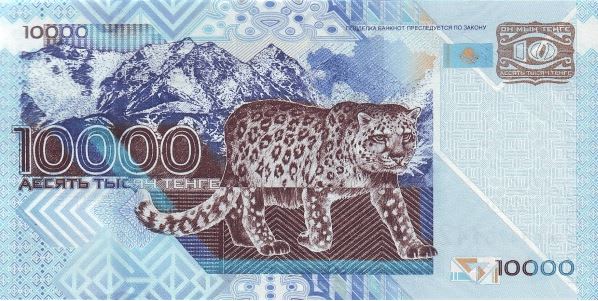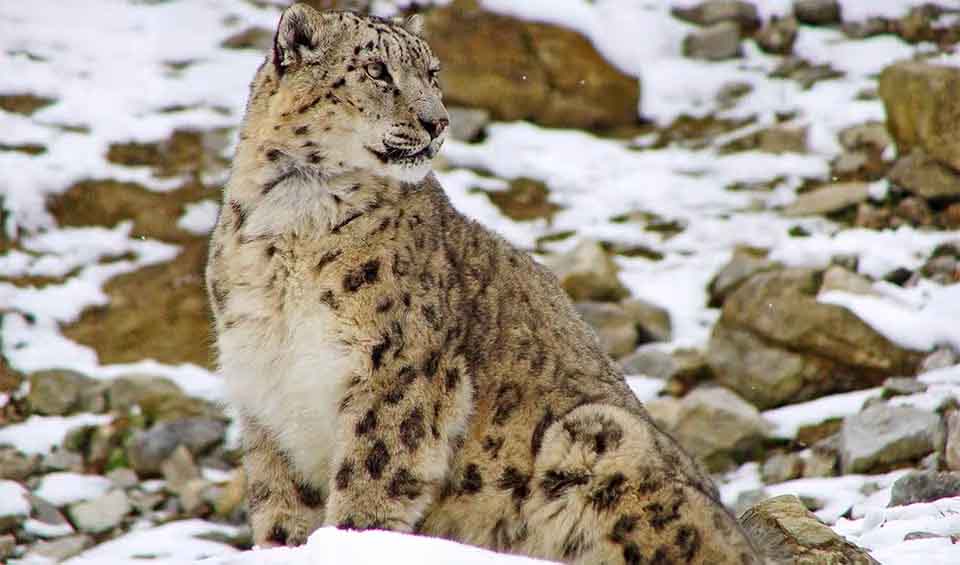Often referred to as the “ghost of the mountains,” it is a magnificent creature that epitomizes the rugged, unyielding spirit of the high-altitude wilderness it calls home. Adorned with a luxurious coat of soft, dense fur in hues of creamy yellowish or gray and covered in distinctive blackish-gray rosettes, this elusive cat is a master of camouflage. Its unique coloring allows it to blend seamlessly into the rocky, snow-covered landscapes of its frosty mountain habitat, rendering it nearly invisible to both prey and predator alike.
Inhabiting the mountain ranges of 12 countries across Central and South Asia, the snow leopard is the most iconic feline of high Asia. It makes its home in elevations ranging from 3,000m to 5,000m (10,000 – 16,500 feet) above sea level, though it has been known to venture as low as 500m (1,600 feet) in search of food or territory. This wide altitudinal range is a testament to the snow leopard’s remarkable adaptability and resilience in the face of extreme environmental conditions.
The snow leopard is supremely adapted for life in its challenging, precipitous terrain. Its powerful, muscular build, long tail for balance, and large, fur-covered paws for walking on snow make it an exceptional hunter, capable of navigating the steep, rocky cliffs that dominate its habitat. Wild caprids, including blue sheep and ibex, constitute the favorite food of the snow leopard, showcasing its prowess as a predator adept at hunting in the rugged landscape it inhabits.
Despite its evolutionary perfection and the awe it inspires, the snow leopard is on the verge of extinction. Human activities pose the greatest threat to its survival. Poaching for their beautiful pelts, retaliatory killings by herders to protect livestock, and the illegal wildlife trade are significant factors contributing to the snow leopard’s decline.
Distribution
 Afghanistan
Afghanistan Bhutan
Bhutan China
China India
India Kazakhstan
Kazakhstan Kyrgyzstan
Kyrgyzstan Mongolia
Mongolia Nepal
Nepal Pakistan
Pakistan Russia
Russia Tajikistan
Tajikistan Uzbekistan
UzbekistanRecent updates
Jan 2024: India’s first snow leopard survey estimates there are 718 snow leopards across the country’s six mountainous regions.
Sep 2023: The National Snow Leopard Survey 2022-2023, supported by the Bhutan For Life project and WWF-Bhutan, has confirmed the presence of 134 snow leopards in Bhutan. This marks a 39.5% increase from the first survey in 2016, which counted 96 individuals.
Feb 2023: A potential conflict looms in the Himalayas as tigers and leopards venture into snow leopard territory as climate warms.
Nov 2022: Snow leopard countries have initiated new conservation programs to help preserve the species. At this meeting, esteemed members of the government, along with international conservation organizations, were in attendance. Additionally, species experts and statisticians were present.
Did you know?
- They have the longest tail of any felid, used as rudder while navigating and as a blanket when resting.
- They shed their fur (molting) twice a year
- Unlike other big cats, they do not roar to announce their presence; their sound box is not designed to roar.
- Can pounce/leap as much as 9m (30 ft) on those hardest frosty mountains!
- China and Eastern Europe are the biggest demand hub, fueling illegal trade.
- People kill 221–500 snow leopards annually; 55% of these are retaliatory killings over livestock depredation, and the rest are mostly poaching for fur or body parts.
- An increase in poaching for skins and body parts after the dissolution of the Soviet Union around 1991
- In February 2023, for the first time ever, a snow leopard has been spotted in Uttarakhand’s Darma Valley in India. This is the first recorded sighting of a snow leopard at these altitudes, as they are usually found at the height of more than 3.6 km (12,000 ft), while Dar village is located at nearly 3.4 km (11,120 ft).
Anything we've missed?
Help us improve this page by suggesting edits. Glory never dies!
Suggest an editGet to know me
Terrestrial / Aquatic
Altricial / Precocial
Polygamous / Monogamous
Dimorphic / Monomorphic
Active: Diurnal / Nocturnal
Social behavior: Solitary / Pack / Herd
Diet: Carnivore / Herbivore / Omnivore / Piscivorous / Insectivore
Migratory: Yes / No
Domesticated: Yes / No
Dangerous: Yes / No
Snow leopard on banknotes







